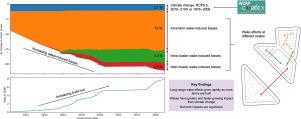The future of offshore wind power production: Wake and climate impacts
IF 10.1
1区 工程技术
Q1 ENERGY & FUELS
引用次数: 0
Abstract
Rapid deployment of offshore wind is expected within the coming decades to help meet climate goals. With offshore wind turbine lifetimes of 25–30 years, and new offshore leases spanning 60 years, it is vital to consider long-term changes in potential wind power resource at the farm planning stage. Such changes may arise from multiple sources, including climate change, and increasing wake-induced power losses. In this work, we investigate and compare these two sources of long-term change in wind power, for a case study consisting of 21 wind farms within the German Bight. Consistent with previous studies, we find a small but significant reduction in wind resource due to climate change by the end of the 21st century under the high-emission RCP8.5 scenario, compared with a historical period, with a mean power reduction (over an ensemble of seven climate models) of 2.1%. To assess the impact of wake-induced losses due to increasingly dense farm build-out, we model wakes within the German Bight region using an engineering wake model, under various stages of (planned) build-out corresponding to the years 2010–2027. By identifying clusters of wind farms, we decompose wake effects into long-range (inter-cluster), medium-range (intra-cluster) and short-range (intra-farm) effects. Inter-cluster wake-induced losses increase from 0 for the 2010 scenario to 2.5% for the 2027 scenario, with intra-cluster losses also increasing from 0 to 4.3%. Intra-farm losses are relatively constant, at around 13%. While the evolution of wake effects therefore outweighs the climate effect, and impacts over a shorter timescale, both factors are significant. We also find evidence of an interaction between the climate and wake effects. Both climate change and evolving wake effects must therefore be considered within resource assessment and wind farm planning.

求助全文
约1分钟内获得全文
求助全文
来源期刊

Applied Energy
工程技术-工程:化工
CiteScore
21.20
自引率
10.70%
发文量
1830
审稿时长
41 days
期刊介绍:
Applied Energy serves as a platform for sharing innovations, research, development, and demonstrations in energy conversion, conservation, and sustainable energy systems. The journal covers topics such as optimal energy resource use, environmental pollutant mitigation, and energy process analysis. It welcomes original papers, review articles, technical notes, and letters to the editor. Authors are encouraged to submit manuscripts that bridge the gap between research, development, and implementation. The journal addresses a wide spectrum of topics, including fossil and renewable energy technologies, energy economics, and environmental impacts. Applied Energy also explores modeling and forecasting, conservation strategies, and the social and economic implications of energy policies, including climate change mitigation. It is complemented by the open-access journal Advances in Applied Energy.
 求助内容:
求助内容: 应助结果提醒方式:
应助结果提醒方式:


